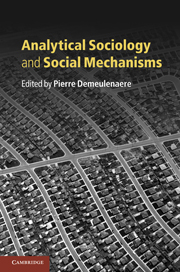Book contents
- Frontmatter
- Contents
- List of figures
- List of tables
- List of contributors
- Introduction
- Part I Action and mechanisms
- Part II Mechanisms and causality
- 5 Generative process model building
- 6 Singular mechanisms and Bayesian narratives
- 7 The logic of mechanistic explanations in the social sciences
- 8 Social mechanisms and explanatory relevance
- 9 Causal regularities, action and explanation
- Part III Approaches to mechanisms
- Index
- References
6 - Singular mechanisms and Bayesian narratives
Published online by Cambridge University Press: 05 June 2012
- Frontmatter
- Contents
- List of figures
- List of tables
- List of contributors
- Introduction
- Part I Action and mechanisms
- Part II Mechanisms and causality
- 5 Generative process model building
- 6 Singular mechanisms and Bayesian narratives
- 7 The logic of mechanistic explanations in the social sciences
- 8 Social mechanisms and explanatory relevance
- 9 Causal regularities, action and explanation
- Part III Approaches to mechanisms
- Index
- References
Summary
Introduction
I shall interpret the social sciences, including sociology, as a quest for causal mechanisms. It is not clear, though, how we should handle situations where it proves difficult or even impossible to find repeated observations of the events which are purportedly in a causal relationship. Historically focused case studies often seem to involve unique or low frequency events, though conjectured causal connections are routinely deployed.
The study of causal mechanisms which account for (or show how) patterns of co-variation are established (generated) by human activity lies at the foundations of analytical sociology. Such mechanisms may be postulated at a latent theoretical level or be subject to direct observation. The boundary between observational and theoretical terms is often flexible depending upon improved observational and measurement techniques. The manner of causal inference, where events are repeated, is well understood, though any inference is always provisional subject to as yet unexplored exogeneity tests, but when it comes to relative rare events the story is much less clear. How can, if at all, causal inferences be safely made in such circumstances?
The chapter develops as follows. First, I briefly review the way in which causal inferences are vouchsafed in repeated observational (i.e. large N) studies. Second, the idea of singular causality is developed based upon the concept of human action. This licenses the notion that sequences of causally connected actions become the focus of attention and thus, third, the concept of narrative takes center stage.
- Type
- Chapter
- Information
- Analytical Sociology and Social Mechanisms , pp. 121 - 135Publisher: Cambridge University PressPrint publication year: 2011
References
- 5
- Cited by



